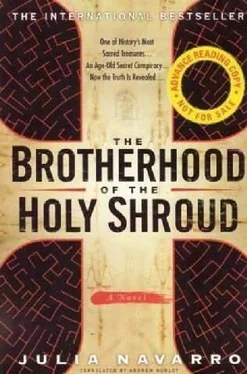"I have news of Turgut."
All eyes turned to Talat, their main conduit to the porter in the Turin Cathedral. His piercing blue eyes were fixed on Addaio.
"We should get him out of there. He's becoming more unhinged by the day. He swears he is being followed, that they no longer trust him in the bishop's offices, and that Rome police officers have remained in Turin to arrest him."
"That is the last thing we can do in the middle of all this, Talat," Bakkalbasi replied.
"Is Ismet ready to travel?" Addaio asked. "He was to prepare himself to take his uncle's place at the cathedral. That is our best course for now."
"His parents have agreed, but the young man seems reluctant. He has a girlfriend here," Talat explained.
"Girlfriend! And because he has a girlfriend he would endanger the entire community? Call them. He will leave today, with our brother Bakkalbasi. Tell Ismet's parents to call Turgut and tell him they are sending their son to reside with him while he looks for a future in Italy. And do it now."
Addaio's peremptory tone left no room for hesitation or disagreement. A short while later, the eight left the mansion, each with precise orders to carry out.
ANA JIMENEZ RANG THE DOORBELL OF A lovely Victorian house in one of London's most elegant neighborhoods. An elderly butler opened the door and greeted her politely. The home could have been the residence of a lord. If this was indeed the bastion of the present-day Knights Templar, it was a far cry from the medieval fortresses they had once defended.
Ana introduced herself and asked to see the director of the organization, Anthony McGilles. It had not been easy to secure an appointment with the well-known scholar, but Ana had called friends of friends, trading on connections in diplomatic circles, and the meeting had eventually been arranged.
The butler asked her to wait in a large, handsomely furnished vestibule, its wood parquet floor covered with thick Persian carpet, its walls hung with paintings of religious scenes. A silver-haired gentleman promptly emerged from a nearby office and greeted her cordially.
McGilles directed Ana to the sofa in his office while he took a seat in a leather armchair. They had barely settled themselves when the butler entered with a tea tray.
For several minutes Ana answered McGilles's questions-he was interested in her work as a reporter and in the political situation in Spain. Finally, the professor got to the point of her visit.
"You're interested in the Templars?"
"Yes. I have to say I was surprised to learn that they still exist and even have an Internet address. That's what led me here."
"This is a center for research and study, that's all. What is it exactly that you want to know?"
"Well, if the Templars really do exist in this day and age, then I'd like to know more about the nature and scope of the organization today, and what it does. And if possible I'd like to ask you about some historical events that the Templars took part in-a very prominent part."
"Well, miss, the Templars as you seem to be imagining them, as they once were, no longer exist."
"Then the Internet listing isn't authentic?"
"No, it's authentic. You're here speaking with me, aren't you? But don't let your imagination run wild picturing knights in shining armor. This is the twenty-first century."
"So I've been told."
"Well, then-we are an organization dedicated to research and study. Our mission is intellectual and social."
"But you are the true heirs of the Temple?"
"When Pope Clement the Fifth suspended the order, the Templars became part of other orders. In Aragon, they became part of the Order of Montesa; in Portugal, King Dinis created a new order, the Orden do Cristo; in Germany they became part of the Teutonic Order. Only in Scotland did the order itself never dissolve. The uninterrupted existence of the Order of Scotland embodies how the Templar spirit has come down to our own days. In the fifteenth century the Scottish Templars became part of the French Garde Ecossaise, which protected the king, and they supported the Jacobites in Scotland. Since 1705 the order has been in the open; that year it adopted new statutes, and Louis Philippe of Orleans became its Grand Master. There were Templars who took part in the French Revolution, in Napoleon's empire, in the struggle for Greek independence, and of course they were part of the French resistance during World War Two……"
"But how? Through what organization? I haven't found historical references to the order operating as such. What are they called?"
"Miss Jimenez, through the years the Templars have lived silently, dedicated to reflection and study, taking part as individuals in these events, although always with the knowledge of their brothers. There are various organizations-lodges, if you like-in which groups of knights meet. These lodges are legal; they are scattered through many countries, and they exist under the laws of each one. You should change your focus on the Order of the Temple; as I say, in the twenty-first century you will not find an organization like that of the twelfth or thirteenth-it simply doesn't exist.
"Our institution here is devoted to studying the history of the Temple and the individual and collective events associated with it, from its founding to our own day," the professor continued. "We examine archives; as historians we review certain obscure events; we seek out old documents… I believe I detect a look of disappointment on your face."
"No, it's that…"
"You were expecting a warrior knight? I'm sorry to disappoint you. I am just a professor retired from the University of Cambridge who, in addition to being a believer, shares with other knights certain principles: a love of truth and justice."
Ana sensed that behind Anthony McGilles's words there was much more, that everything couldn't be that clear, that simple.
"Professor, I appreciate your kindness in explaining all this. I know I'm taking advantage of your patience, but I wonder if you could help me understand an event that I think the Templars were involved in?"
"I'll try, of course. If I don't know the answer, we'll go to our computerized archive. What's the event?"
"I'd like to know whether the Templars took the Holy Shroud that is now in Turin from Constantinople during the reign of Balduino the Second. The shroud disappeared at that time and didn't reappear, in France, until almost a century later."
Had she imagined just the slightest ripple in his urbane demeanor?
'Ah, the shroud… So much controversy! So many legends! My opinion as a historian is that the Temple had nothing to do with its disappearance."
"Would it be possible for me to explore a bit in your archives? I've come all this way…"
"I think we can arrange that. I'll have Professor McFadden help you."
"Professor McFadden?"
"I must go to a meeting, but I leave you in good hands. Professor McFadden is our chief archivist, and he'll help you with anything you need."
McGilles picked up a small silver bell and rang it gently. The butler entered immediately.
"Richard, take Miss Jimenez to the library. Professor McFadden will meet with her there."
"I appreciate your help, professor."
"I hope we may be of service to you, Miss Jimenez. Good day."
A.D. 1291
Guillaume de Beaujeu, Grand Master of the Temple, carefully slid the document into the secret drawer in his writing table, his lean face troubled. The missive from the brothers in France was yet more proof fhat the Temple no longer had as many friends at the court of Philippe IV as they'd had in the time of good King Louis-may God protect him and glorify him, for there had been no more chivalrous and valiant king in all of Christendom.
Читать дальше












